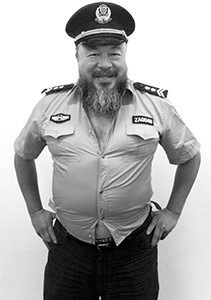Notes From Day Seven: Civil rights on the other side of the planet, Part 2
 CREDIT: NYOGALLERISTNY.FILES.WORDPRESS.COM
CREDIT: NYOGALLERISTNY.FILES.WORDPRESS.COMAi Weiwei uses his art to champion human rights issues in China.
Last week I wrote about Martin Luther King Jr., the U.S. civil rights leader of the 1960s. Fifty years ago this summer he delivered the famous “I have a dream” speech, and died from an assassin's bullet not long after. I noted that King's speech was loaded with Christian and biblical themes. The same can be said for the civil rights thought of many who have advocated for rights in the Western world. This includes William Wilberforce, the English anti-slavery crusader, and Bishop Desmond Tutu, the antiapartheid activist of South Africa who is still living.
I ended last week's article with the mention of AiWeiwei, a Chinese artist. His work has been on exhibit at the Art Gallery of Ontario (AGO) this past summer. If you don't see it, there are plenty of images and text about him online.
I mentioned Ai Weiwei because his art is a vehicle for his own civil and human rights activism. Ai Weiwei does not come out of the Christian tradition as so many rights advocates in the West have. So, a question that comes up is, can there be a relation between human rights movements that do not appear to owe much to Christian foundations and those that do?
There is no question about the profound human rights perspectives that Ai Weiwei puts forward in his work. The first piece in the AGO exhibit is called Snake Ceiling. It is made of hundreds of backpacks attached together to form an enormous snake. The inspiration for this piece comes in part from backpacks left behind in the rubble of an earthquake in China — an earthquake that killed thousands of schoolchildren. Ai Weiwei objects to what he sees as the Chinese government not being sufficiently concerned to remember the dead, and not drawing attention to a possible cause of so many dying: poor construction.
Ai Weiwei had to do a lot of his own investigating to find the names and statistics of the dead children. He has posted them on a large wall exhibit. You can stand in front of it overwhelmed by the enormity of the list — and struck by the human loss as an audio recording of each name is heard, one by one.
Another related piece, Steel Rebar, consists of 40 tons of concrete reinforcing bar recovered from the earthquake site. Each piece has been straightened. The pieces have been cut and stacked not only to remember the dead and the earthquake destruction, but also to symbolize the divisions that exist in Chinese society today.
While people all over the world celebrate Ai Weiwei, the Chinese government treats him as a dangerous man. It does not permit him to travel outside the country. Since he has focused on using his art to draw attention to the value of each person, he is under surveillance. According to the essay produced for the AGO exhibit, he's been beaten by Chinese authorities.
Would Ai Weiwei, who appears to come from a secular and atheist background, find himself with much to say to Rev. King? Clearly, they share a deep concern for the rights of all persons. Each would say that all persons are valued. No doubt, King would express great appreciation for the way Ai Weiwei confronts people with deep questions about human identity and value.
At the same time, perhaps Ai Weiwei would find himself drawn to the Christian tradition and its awareness of God, God as the Creator and therefore the foundation of human rights and individual value. God, whose glory becomes visible when all persons are treated with fairness and compassion. God, who invites all people beyond a grim recognition that there is much work to be done with respect to human rights; who invites us even beyond a release from this work if it should ever end; who invites us to joy.
Love. Respect for all. Compassion. Justice. Joy. These are what God has created us to experience. I think King understood this. I think his black church audiences and white supporters fed on it. And though King was persecuted and assassinated, I guess that he saw God's glory and tasted his joy.
Editorial opinions or comments expressed in this online edition of Interrobang newspaper reflect the views of the writer and are not those of the Interrobang or the Fanshawe Student Union. The Interrobang is published weekly by the Fanshawe Student Union at 1001 Fanshawe College Blvd., P.O. Box 7005, London, Ontario, N5Y 5R6 and distributed through the Fanshawe College community. Letters to the editor are welcome. All letters are subject to editing and should be emailed. All letters must be accompanied by contact information. Letters can also be submitted online by clicking here.













